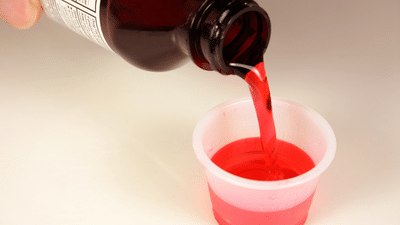At least 20 children have died and five others are battling kidney failure in Madhya Pradesh, after consuming contaminated Coldrif cough syrup manufactured by Sresan Pharmaceuticals, Tamil Nadu. The syrup in question was found to contain dangerously high levels of diethylene glycol (DEG), a toxic chemical that is commonly used in antifreeze and industrial solvents, which is lethal when ingested.
Of the children affected, most were from Chhindwara district and developed symptoms such as vomiting and difficulty urinating shortly after. According to the PTI report, the central government, through the Directorate General of Health services, issued an advisory asking all the states and Union Territories NOT to prescribe cough and cold medications to children below the age of two years.The advisory emerged amid reports of child deaths in Madhya Pradesh and Rajasthan allegedly linked to contaminated cough syrups.
The deadly toxin: Diethylene Glycol

According to the National Institutes of Health, Diethylene Glycol is a colourless, odourless fluid that primarily was used in industrial purposes. It is not meant for human consumption. As to what the NIH says, Diethylene Glycol is a colourless liquid, denser than water. Contact may slightly irritate skin, eyes and mucous membranes. May be slightly toxic by ingestion. Used to make other chemicals.
It's poisoning can lead to severe neurological symptoms such as confusion and seizures and metabolic acidosis (where the body’s acid-base balance is disrupted), and can ultimately be fatal if left untreated. Usually, its symptoms appear within 24-72 hours of ingestion, emphasising on the narrow window of medical intervention.
Symptoms of diethylene glycol poisoning

The first phase is acute gastrointestinal toxicity and consists of nausea, vomiting, abdominal pain, and diarrhea.
Second phase: Renal or kidney failure, fluid retention, swelling, back pain, Oliguria (reduced urine output) or anuria (no urine output), Fluid retention or swelling (edema)
Historical precedents
Unfortunately, this is not the first time diethylene glycol contamination has caused mass poisoning:
Mumbai, India, 1986: Fourteen patients at J.J. Hospital died due to acute renal failure caused by contaminated glycerol with 90% DEG. The tragedy exposed failures in drug procurement and safety monitoring.
Uzbekistan, 2022: Eighteen children died after consuming cough syrup contaminated with DEG and ethylene glycol, produced by an Indian pharmaceutical company.
The current crisis in Madhya Pradesh
The contaminated Coldrif syrup, batch SR-13 with expiry in April 2027, was found to contain approximately 48.6% diethylene glycol. After the first death was reported on September 2, the toll has tragically climbed to 20 children, with multiple others suffering from kidney failure. The affected children initially experienced fever and cold, followed by vomiting and difficulty urinating, classic symptoms of DEG poisoning. According to several media reports, Dr. Praveen Soni, a pediatrician who prescribed the syrup to many of the children affected, is stirring controversy. For now, families await for justice, health professionals demand better safeguards, not just for children but also for those entrusted with their care.
Of the children affected, most were from Chhindwara district and developed symptoms such as vomiting and difficulty urinating shortly after. According to the PTI report, the central government, through the Directorate General of Health services, issued an advisory asking all the states and Union Territories NOT to prescribe cough and cold medications to children below the age of two years.The advisory emerged amid reports of child deaths in Madhya Pradesh and Rajasthan allegedly linked to contaminated cough syrups.
The deadly toxin: Diethylene Glycol

According to the National Institutes of Health, Diethylene Glycol is a colourless, odourless fluid that primarily was used in industrial purposes. It is not meant for human consumption. As to what the NIH says, Diethylene Glycol is a colourless liquid, denser than water. Contact may slightly irritate skin, eyes and mucous membranes. May be slightly toxic by ingestion. Used to make other chemicals.
It's poisoning can lead to severe neurological symptoms such as confusion and seizures and metabolic acidosis (where the body’s acid-base balance is disrupted), and can ultimately be fatal if left untreated. Usually, its symptoms appear within 24-72 hours of ingestion, emphasising on the narrow window of medical intervention.
Symptoms of diethylene glycol poisoning

The first phase is acute gastrointestinal toxicity and consists of nausea, vomiting, abdominal pain, and diarrhea.
Second phase: Renal or kidney failure, fluid retention, swelling, back pain, Oliguria (reduced urine output) or anuria (no urine output), Fluid retention or swelling (edema)
Historical precedents
Unfortunately, this is not the first time diethylene glycol contamination has caused mass poisoning:
Mumbai, India, 1986: Fourteen patients at J.J. Hospital died due to acute renal failure caused by contaminated glycerol with 90% DEG. The tragedy exposed failures in drug procurement and safety monitoring.
Uzbekistan, 2022: Eighteen children died after consuming cough syrup contaminated with DEG and ethylene glycol, produced by an Indian pharmaceutical company.
The current crisis in Madhya Pradesh
The contaminated Coldrif syrup, batch SR-13 with expiry in April 2027, was found to contain approximately 48.6% diethylene glycol. After the first death was reported on September 2, the toll has tragically climbed to 20 children, with multiple others suffering from kidney failure. The affected children initially experienced fever and cold, followed by vomiting and difficulty urinating, classic symptoms of DEG poisoning. According to several media reports, Dr. Praveen Soni, a pediatrician who prescribed the syrup to many of the children affected, is stirring controversy. For now, families await for justice, health professionals demand better safeguards, not just for children but also for those entrusted with their care.
You may also like

BBC issues apology over error in internal email addressing Hamas attacks anniversary

BREAKING: Westminster Bridge closed as police issue urgent warning to avoid area

Delhi gears up for diplomatic game-changer with Afghan FM Amir Khan Muttaqi's visit

Telangana's Gurukul schools on verge of closure, says KTR

2nd Test: Sammy Calls For Belief And Discipline From West Indies' Players To Make A Turnaround Against India







